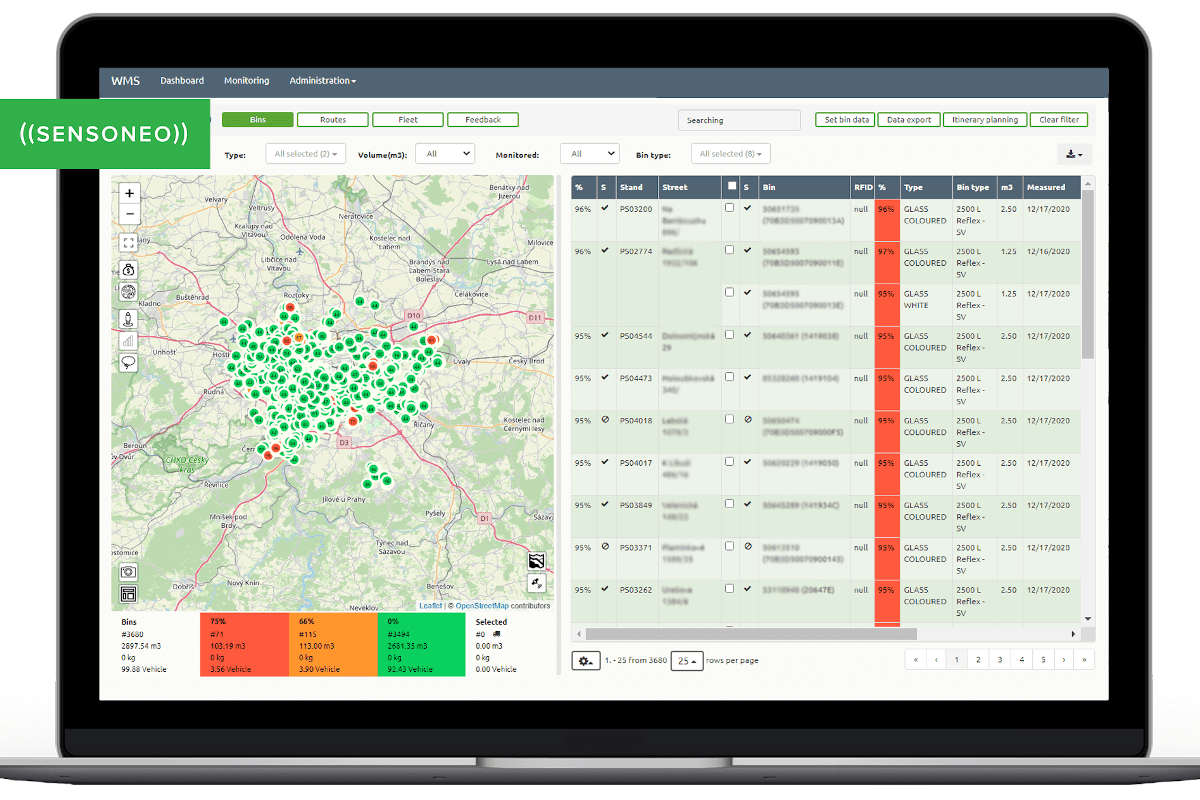
The city of Prague is to pilot dynamic waste collection via automated collection routes. Seemingly impressive in scale for a trial of this kind – encompassing over 130k bins and 150 collection vehicles – the project is anticipated to deliver improvements in efficiency and environmental impact for waste collection.
This “dynamic waste collection” is part of an ambitious project by waste management solutions start-up Sensoneo, with funding partly provided by the Horizon2020 program of the European Innovation Council.
The project includes the following elements:
· Collection efficiency analysis for all waste commodities using Sensoneo’s proprietary method, based on processing all currently available data related to containers, vehicles and realized routes. It supports the identification of weak points and opportunities for savings and improvement of the quality of service;
· Set-up of new cycling routes and frequencies in order to increase the continuous efficiency and quality of service. This is said to combine the shortest possible routes, on-time collection, and maximum possible utilization of vehicle capacity with the long-term goal to reduce the number of vehicles used during waste collection;
· Collecting waste via automated routes (flexibly reflecting daily specific requirements) using Sensoneo’s navigation, which is tailor-made for the unique requirements of individual waste collection vehicles. This facilitates the employment of drivers without prior driving experience in particular districts or particular routes;
· Final evaluation: showcases savings (time, cost, fuel, emissions) with a BEFORE-AFTER comparison.
Along with the above, the project also includes the real-time monitoring of 550 containers for electronic waste with Sensoneo sensors. This will seemingly optimize waste collection, and ensure that sufficient free capacity is available for citizens to deposit further waste for recycling.

Patrik Roman, CEO of Pražské služby, a wholly-owned subsidiary of the city of Prague, responsible for waste services, said: “Digitization is a huge topic in the field of waste management. It has been our long-term goal to identify and implement the tools that drive the improvement of the waste collection process and the quality of our service. This project upgrades the established systems of daily planning, real-time performance monitoring and evaluation. Planning waste collection routes for over 130 thousands containers in Prague is a complex and very demanding job and the succesfull outcome of this project can siginificantly help to improve it.”
Šárka Koháková, Logistics Manager at Asekol, which handles takeback of WEEE for the city, said: “With this project, we will be able to equip most WEEE containers across Prague with sensors and thus make the collection of discarded electronic equipment even more efficient. We expect that the ability to provide sufficient free capacity in containers will support the positive attitude of the citizens to the sorting of electrical waste.”
Martin Basila, Founder and CEO of Sensoneo, said: “We have chosen Prague as one of the key partners based on our experience with the underground containers monitoring project. We perceive the Czech capital as one of the European leaders in the introduction of smart technologies and support of the transition to a circular economy. We believe that our tools bring great gains to the city’s daily operations. We are convinced that the evaluation will ultimately prove the tangible benefits of our solution to both the environment and the economy – reducing the carbon footprint and improving resource efficiency.”
Michal Fišer, CEO of Operátor ICT, which provides a variety of information and communication technologies services for Prague, said: “A proactive approach and the use of innovative technologies is part of our urban DNA. Our company drives the testing and implementation of innovative technologies and we are doing our best to further utilize the data we collect from them. Smart waste collection is part of our Smart Prague 2030 strategy, which defines a zero-waste city as one of its priorities, and we believe this should be built on responsible and intelligent waste management.“
The preparation phase of the project has already started and the launch of the operational phase is scheduled for March 2021. The entire project, including the evaluation, will run until September 2022.







